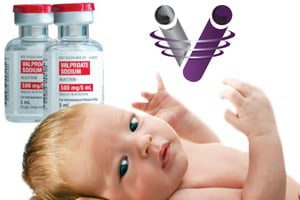
Valproate-containing epilepsy drugs have long been linked to serious adverse health effects, including risks of babies being born with birth defects. Depakote is a valproate-containing medication. For instance, while the use of epilepsy medications during pregnancy has been associated with congenital malformations, the drugs’ impact on cognitive development is less understood. Studies have linked in […]
 Valproate-containing epilepsy drugs have long been linked to serious adverse health effects, including risks of babies being born with birth defects. Depakote is a valproate-containing medication.
Valproate-containing epilepsy drugs have long been linked to serious adverse health effects, including risks of babies being born with birth defects. Depakote is a valproate-containing medication.
For instance, while the use of epilepsy medications during pregnancy has been associated with congenital malformations, the drugs’ impact on cognitive development is less understood. Studies have linked in utero exposure to the drugs to impairments associated with psychomotor function, language development, IQ scoring, and behavioral problems, the authors say, wrote MedPage Today recently.
Now, Royal Melbourne Hospital epilepsy experts say that there is a way in which to reduce the risks of two birth defects, according to the HeraldSunNews. The hospital’s epilepsy specialist and head of the University of Melbourne’s Department of Medicine, Professor Terry O’Brien, told the HeraldSunNews that the team discovered that valproate increased risks for spina bifida and hypospadias, a defect in which the urethra opening is on the underside, not the end, of the penis.
The observational study involved 1700 women and revealed that 80 percent of the babies who were born with spina bifida—a defect of the spine and spinal cord—had been exposed to valproate in utero. The higher the dose, the greater the effects, according to the HeraldSunNews. The research appears in the journal American Academy of Neurology. Professor O’Brien said the team found that a reduced valproate dose during the first pregnancy trimester could control women’s seizures while not increasing risks for spina bifida and hypospadias. “It’s a critical finding of international significance,” he told the HeraldSunNews.
Valproate has been linked in studies to other issues in children exposed to the drug in utero, including abnormal scores on tests on motor development and autism traits. In addition to higher abnormal scores for gross motor skills, autistic traits, and sentence skills in children exposed to the drugs in utero, increases in congenital malformations in these children were found, MedPage Today reported.
We also recently wrote that another study found that valproate use by pregnant women was associated with a significantly increased risk of their babies developing autism, according to a study in the Journal of the American Medical Association. Valproate has also been linked to increased risks for congenital malformations and delayed cognitive development; little information is available on valproate’s risks for other significant neuropsychiatric disorders.
A prior Danish study revealed additional evidence that fetal exposure to Depakote, specifically its active ingredient, valproate, increases a baby’s risk of developing autism spectrum disorders (ASD) three-fold. Depakote, approved for the prevention of migraines, treating acute manic episodes in bipolar patients, and halting seizures in adults and children, has been associated with birth defects when taken by pregnant women.
Just prior to that, 26 women filed lawsuits claiming that the makers of Depakote illegally marketed the drug for off-label purposes and failed to warn of the side effects of the drug. Each of the women claimed they were prescribed and took Depakote just before getting pregnant or during the first trimester of their pregnancy and that the drug caused them to give birth to children with a wide array of severe, some life-threatening, birth defects.


